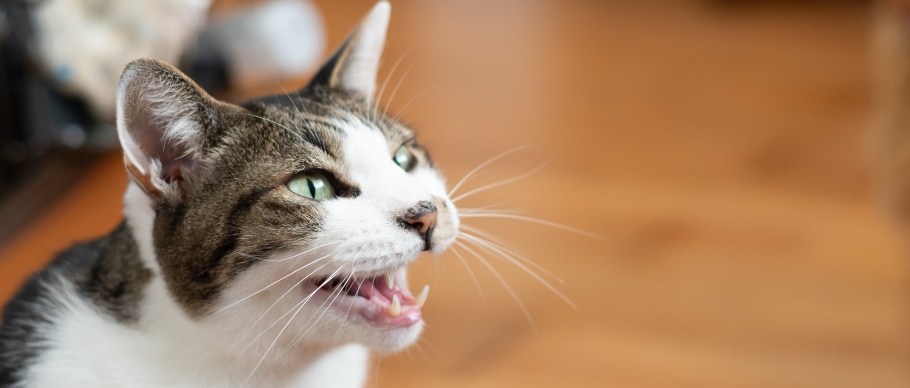Why Is My Cat Meowing So Much?
If you've ever found yourself wondering, "why does my cat meow so much," you're not alone! Sometimes meowing is just a quirky kitty habit, but it can also be a way for cats to communicate a host of messages to us. Discover the reasons why your cat is so vocal and the best ways to manage excessive meowing.
7 Possible Reasons Why Your Cat Won’t Stop Meowing
From saying hello to begging for food, there can be a few reasons why your cat is meowing so much.
Reason #1: Hunger or Thirst
It’s not unusual for a feline to stand by their bowl and meow, especially if their feeding time is approaching. They could be telling you they are hungry, thirsty, or simply want a treat!
Reason #2: Pain or Illness
Unfortunately, cats often meow suddenly or loudly when they are hurt or sick. If your feline is consistently meowing around the potty, this may be their way of communicating that they are in pain while they go and could be suffering from a cat UTI.
Reason #3: Aging-Related Issues
Many senior cats experience cognitive decline as they age, and one of their behavioral changes could be more frequent meowing. Older cats may also have hearing loss, which might result in repeated and loud meowing if they struggle to regulate their volume.
Reason #4: Stress or Anxiety
It’s easy to tell by a cat’s body language when they are feeling stressed, scared, or anxious. In addition to wide eyes, a fluffy tail, and pinned-back ears, your feline might meow excessively and in a different tone than their usual meow.
Reason #5: Seeking Entry or Exit
If your cat just meows at the door, they likely want to be let in or out of the room.
Reason #6: Heat Cycle
Cats in heat experience a wide variety of changes because of their fluctuating hormones. They can become flirty and extremely affectionate, and meowing is one of the ways they’ll show it!
Reason #7: Attention Seeking
When your cat won’t stop meowing by your side, they may just be trying to get your attention—especially if they have spent some time alone. In addition to meowing, they might start kneading you or “making biscuits” to get your interest.
🐾 Related: Do Cats Get Lonely? 7 Tips for a Happy Home-Alone Kitty
When to Be Concerned About Cat Meowing
If you’re unsure why your cat is meowing so much, it’s always best to consult your veterinarian; there may be something bothering your kitty. Other signs of an underlying issue can include:
- Sudden increase in meowing
- Meowing accompanied by other concerning symptoms
- Nighttime vocalization that is disruptive and constant
- Unexplained weight loss or gain
- Meowing that seems distressed or painful
Don’t worry—meowing doesn’t always mean there is a health or behavioral problem with your kitty. Certain breeds, like the Siamese cat, are just naturally very talkative!

What to Do When Your Cat Won’t Stop Meowing
Although meowing is a normal behavior, it can become frustrating for both you and your cat when it is nonstop. Here are a few ways to help keep your kitty’s meowing more tamed.
Tip #1: Reduce Anxiety Stressors
Felines can be very sensitive to loud noises, changes in routine, or separation from their person. It’s important to socialize kittens early so they are more confident when they’re on their own or in unfamiliar situations.
You can also calm down your cat with soothing techniques like gentle petting, music, and interactive play.
Tip #2: Keep Them Occupied
Prevent cat boredom by planning playtime sessions throughout the day or offering a toy for mental stimulation. You can also get some special bonding time by grooming your feline with the Love Glove®. It’s an easy way to show extra affection and help keep their coat looking fresh!
Tip #3: Create an Accessible Environment
Another simple way to keep your cat’s meowing at bay is to keep the doors inside your home open whenever possible. Be sure to place your feline’s food and water bowls in an easily reachable spot.
Tip #4: Practice Mealtime Trainings
If your cat begs for food, you can work on training them to be quiet before mealtime. All you need to do is wait until your cat stops meowing before giving them their food. It will take time, but your cat should learn that meowing does not get a reward.
Tip #5: Take Care of Their Health
Since felines meow more when they are sick or in pain, it’s important to maintain a routine that helps them feel their very best. Be sure to keep up with regular vet checkups, provide a healthy diet, and remember to groom your cat!
Chatty Cat!
Now that we’ve answered the question, “why is my cat meowing so much,” you’ll have a better understanding of their needs. By paying attention to their unique sounds and what their body is telling you, you and your feline friend can form an even stronger bond!
Does your cat meow when they have the zoomies? Learn more about this bizarre behavior!








.jpg?h=&hash=51028EE92142B4AE3DDA42EBE31CFE7B)
